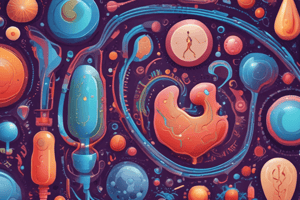Podcast
Questions and Answers
What is the primary function of insulin in the body?
What is the primary function of insulin in the body?
Insulin acts on body cells to absorb glucose, thus decreasing the blood glucose levels.
Which hormone is released by the pancreas to increase blood glucose levels?
Which hormone is released by the pancreas to increase blood glucose levels?
- Adrenaline
- Amylin
- Insulin
- Glucagon (correct)
Insulin is mainly responsible for inhibiting gluconeogenesis in the liver.
Insulin is mainly responsible for inhibiting gluconeogenesis in the liver.
True (A)
______ is a form of energy storage that is a chain of glucose molecules.
______ is a form of energy storage that is a chain of glucose molecules.
Match the type of Diabetes Mellitus with its description:
Match the type of Diabetes Mellitus with its description:
Flashcards are hidden until you start studying
Study Notes
Blood Glucose Regulation
- Two hormones regulate blood glucose: insulin and glucagon
- Glucose (C6H12O6) is a monosaccharide and the fuel for making ATP in cellular respiration
- Glycogen is a polysaccharide and a form of energy storage
- Insulin and glucagon have antagonistic effects and work together to maintain blood sugar homeostasis
Insulin vs. Glucagon
- Insulin is released by β-cells in the pancreas and helps glucose enter cells, decreasing blood glucose levels
- Glucagon is released by α-cells in the pancreas and stimulates the liver to increase blood glucose levels
- Insulin acts as a key to facilitate glucose transport into cells, while glucagon promotes glycogen breakdown to glucose
Control of Blood Glucose Levels
- High blood sugar:
- Stimulates pancreatic insulin release
- Insulin facilitates glucose transport, glycogen synthesis, and inhibits glycogenolysis, lipolysis, and gluconeogenesis
- Low blood sugar:
- Stimulates pancreatic glucagon release
- Glucagon promotes glycogen breakdown, gluconeogenesis, and inhibits protein synthesis
Insulin and Oral Hypoglycaemic Agents
- Diabetes mellitus is a metabolic disorder characterized by high blood glucose levels
- Two main types of diabetes:
- Type I (Insulin-Dependent Diabetes Mellitus): autoimmune or idiopathic, with low insulin levels
- Type II (Non-Insulin-Dependent Diabetes Mellitus): high insulin levels, insulin resistance, and late onset
Insulin Mechanism of Action
- Insulin acts on specific receptors on the cell membrane, which are receptor tyrosine kinases
- Insulin binding causes a conformational change, activating the tyrosine kinase activity, which stimulates glucose uptake, glycogen synthesis, and inhibits glycogenolysis
Insulin Preparations
- Four types of insulin preparations:
- Rapid-acting (lispro, aspart, glulisine): peak effect 1-1.5 hours, duration 3-4 hours
- Short-acting (regular insulin): peak effect 2.5 hours, duration 4-6 hours
- Intermediate-acting (NPH or isophane insulin): peak effect 8 hours, duration 10-16 hours
- Long-acting (insulin detemir, insulin degludec, insulin glargine): no peak effect, duration 24 hours
Adverse Effects of Insulin
- Hypoglycaemia, lipodystrophy, redness, swelling, itching, weight gain, sweating, coma, fatigue, hunger
Oral Hypoglycaemic Agents
- Biguanides (metformin, phenformin):
- Mechanism of action: inhibits hepatic gluconeogenesis, increases glycolysis, and peripheral glucose uptake
- Adverse effects: lactic acidosis, B12 deficiency, gastrointestinal upset
- Sulphonylureas (first, second, and third generation):
- Mechanism of action: insulin secretagogues, blocking ATP-dependent K+ channel, sensitizing β-cells to glucose, and limiting gluconeogenesis
- Adverse effects: hypoglycaemia, weight gain, stomach upset, hunger
- Meglitinides (nateglinide, repaglinide):
- Mechanism of action: increases insulin release, blocking ATP-dependent K+ channel
- Adverse effects: hypoglycaemia
- DPP-4 inhibitors (linagliptin, saxagliptin, sitagliptin, vildagliptin):
- Mechanism of action: inhibits DPP-4, potentiating GLP-1
- Adverse effects: stomach upset, upper respiratory infection, stuffy or runny nose, headache
- GLP-1 agonists (dulaglutide, semaglutide, exenatide, liraglutide):
- Mechanism of action: stimulates glucose-dependent insulin release, inhibits glucagon release, and slows gastric emptying
- Adverse effects: pancreatitis, diarrhoea, headache, weakness, dizziness
- SGLT-2 inhibitors (canagliflozin, dapagliflozin, empagliflozin):
- Mechanism of action: inhibits sodium-glucose cotransporter-2, decreasing glucose reabsorption
- Adverse effects: glucosuria, urinary tract infection, vaginal yeast infection, hyperkalaemia, dehydration, ketoacidosis
- Alpha-glucosidase inhibitors (acarbose, miglitol):
- Mechanism of action: inhibits intestinal brush-border alpha-glucosidases, converting complex carbohydrates to monosaccharides
- Adverse effects: gastrointestinal distress, increased colonic gas production
- Thiazolidinediones (glitazones):
- Mechanism of action: activates PPARs, increasing insulin sensitivity
- Adverse effects: heart failure, weight gain, macula edema, increased fracture risk
- Amylin:
- Mechanism of action: inhibits glucagon secretion, delays gastric emptying, and acts as a satiety agent
- Adverse effects: nausea, vomiting, headache, hypoglycaemia
Studying That Suits You
Use AI to generate personalized quizzes and flashcards to suit your learning preferences.




